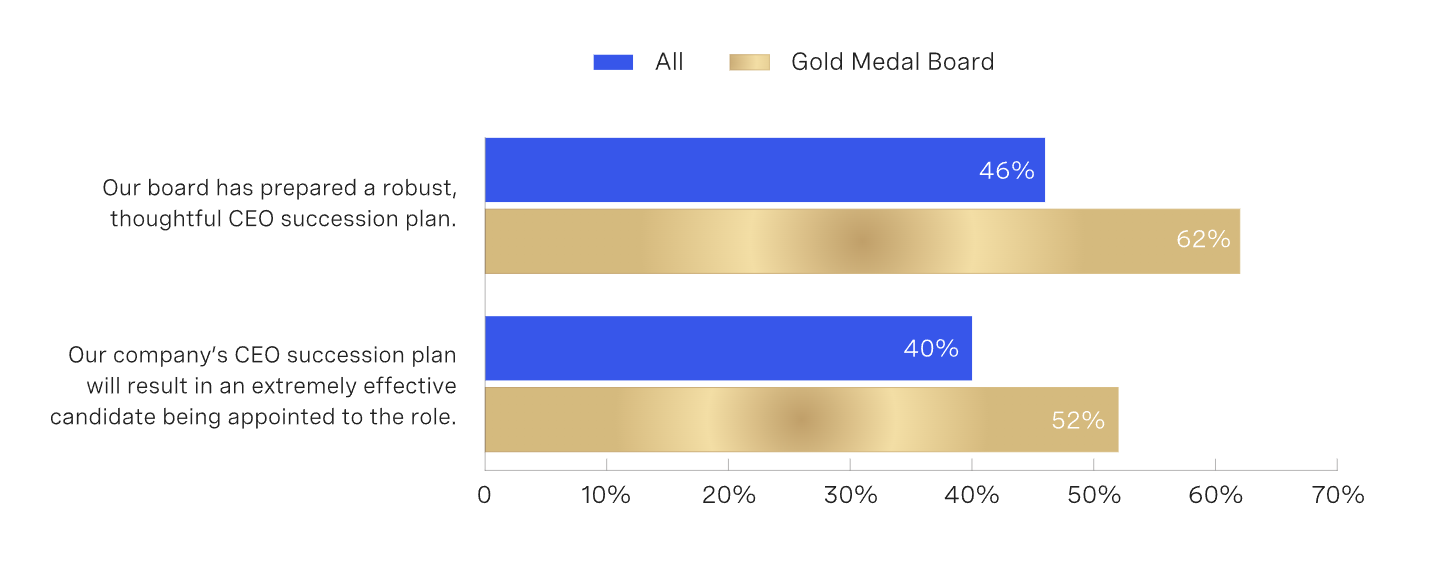Rusty O’Kelley co-leads the Board and CEO Advisory Partners in the Americas, Rich Fields leads the Board Effectiveness practice, and Laura Sanderson co-leads the Board and CEO Advisory Partners in Europe at Russell Reynolds Associates. This post is based on a Russell Reynolds memorandum by Mr. O’Kelley, Mr. Fields, Ms. Sanderson, PJ Neal, Jemi Crookes, and Elena Loridas.
Consciously or unconsciously, every board independently decides where it is going to focus its attention and efforts.
We asked directors to reflect on their board agenda over the past 12 months and identify the top three areas where their full board has spent the most time, and we then ranked those items based on how frequently they end up in a top-three list. There was substantial movement between 2019 and 2022—no surprise, given the significant upheaval and challenges companies faced in 2020 and 2021. But there were also differences between how typical boards spend their time and how Gold Medal Boards (boards whose directors rate their board effectiveness as a 9 or 10 on a 1-10 point scale, and report the company as having outperformed relevant TSR benchmarks for two or more consecutive years) spend their time, as shown in the visual below.
As we wrote in Harvard Business Review in 2020, “Reviewing financial statements, audit activities, and compliance activities are the responsibility of the board, not the mission of the board. The most successful boards not only know this, but they craft their work and interactions to reflect it.” [1] How boards prioritize topics and structure their agendas to focus on future focused, strategic topics is critical. We saw that when we looked at how Gold Medal Boards focus their time in 2019, and we see it again in 2022.
Source: Russell Reynolds Associates’ 2022 Global Board Culture and Director Behaviors Survey. Directors were asked the top three areas where their full board has spent the most time over the past 12 months; answers are ranked by frequency of selection. N=1,036. 2022.
Amid a global pandemic, economic turbulence, and societal upheaval, Gold Medal Boards continued to stay focused on value-creating work: strategic planning, operational performance, M&A, and capital allocation. COVID-19 response was on the agenda, too—no surprise—but ranked below M&A. Why? Gold Medal Boards know that challenging times create opportunities to acquire weaker competitors, complementary firms, or key partners who have run into trouble and are looking for an exit.
Gold Medal Boards also were more likely than typical boards to focus on succession planning for both CEOs and board members in 2021. It looks like those efforts paid off:
Source: Russell Reynolds Associates’ 2022 Global Board Culture and Director Behaviors Survey. Percentage of directors saying yes to the statements. N=975. 2022.
Source: Russell Reynolds Associates’ 2022 Global Board Culture and Director Behaviors Survey. Percentage of directors saying yes to the statement. N=975. 2022.
From Insight to Action
Board leaders and board members collectively need to ensure that their board stays focused on what matters most:
- Forward-focused and value-creating agendas: Too many boards focus on backwards-looking compliance and review activities at the expense of forward-focused, value-creating efforts. Reviewing financial statements and audit activities are important and must be done well, but setting strategy, overseeing operational excellence, making sure M&A is strategic and successful, and similar activities all help create the future and create value. Boards need to step back, readjust their agenda, and reallocate their time.
- Driven to perform: It is almost impossible for board leaders to improve the quality of their board if they do not have the data necessary to measure and assess performance. The best boards know this—that is why they are more likely to do full board as well as individual director review activities and give performance feedback to directors. Clear, concise, evidence-based performance data is the foundation for improving individual director—and ultimately, the full board’s—performance.
- Successful succession events: CEO succession is one of the most important activities a board will ever undertake. Too many CEO searches are done at the last minute and fail to create lasting value for the business or shareholders. Boards need to make sure long term CEO succession planning is a constant undertaking, high on the boardroom agenda, that the board always has ideas regarding potential succession candidates and that, if a succession had to take place tomorrow, they are confident that an extremely effective candidate would be appointed to the role.
Methodology
Over 1,100 supervisory board-level directors from more than 41 countries participated in the Russell Reynolds Associates’ 2022 Global Board Culture and Director Behaviors Survey, with 55 percent of respondents based in Europe, 27 percent in the Americas, 12 percent in Oceana, 3 percent in Asia, 2 percent in Africa, and 1 percent in the Middle East. Industries represented included financial services (26 percent of respondents), industrial and natural resources (22 percent), consumer (11 percent), technology (11 percent), healthcare (10 percent), and professional and business services (6 percent). Forty-four percent of respondents’ companies had annual revenue over $1 billion.
Endnotes
1https://hbr.org/2020/02/top-boards-do-these-4-things-differently(go back)
 Print
Print

